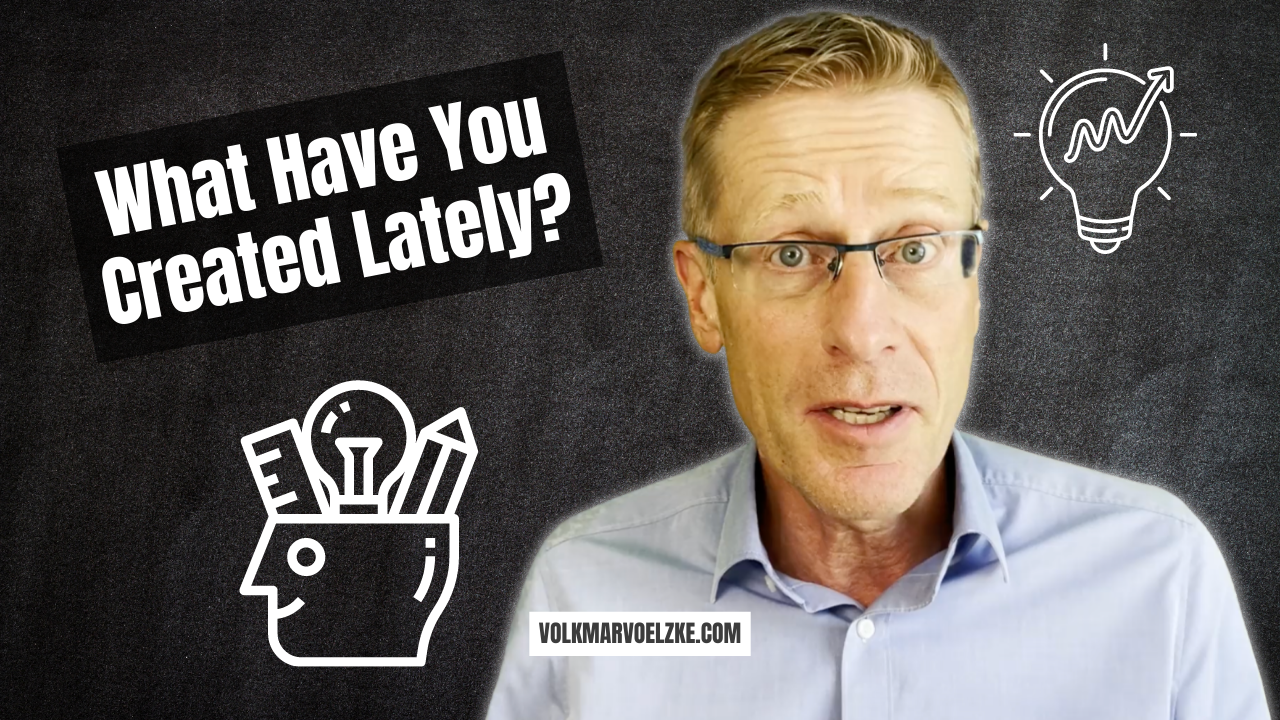🚀 5 Unusual Productivity Tips

High productivity is a topic that usually comes across as a little "unsexy", but it has a huge impact on your success and fulfillment.
This is especially true in leadership: If you as a leader significantly increase your productivity, you will have more time and energy to take care of the really important things, like developing your people or establishing strategic directions.
Most leaders I know complain about "too little time." In other words, their productivity is too low. So it's about time to work on this issue more intensively.
An important insight at the beginning: We all can always become more productive, i.e. achieve significantly more with the same input or the same results with significantly less input.
The difference in productivity can easily be a factor of 10, 100 or even 1000.
There are various methods how you can achieve this. I'll go into that elsewhere (or 👉 contact me for more info).
Here in this memo, I'll give you five somewhat unusual tips that can have a s...
🤷 Why We Make Things More Complicated Than They Are

After all, there are various things that stand in our way on the path to greater success and fulfillment. One of them is the tendency to make things more complicated than they are.
Now, don't tell me that this doesn't affect you. I bet that if I were to observe you, we would identify various things that you are making more complicated than they need to be.
To get to the root of the matter, I share below:
- three main causes,
- then the main effects (i.e., how you recognize unnecessary complicatedness), and
- three steps you should take to make the complicated simple.
Let's get started with the three most important reasons:
- Feeling of power. Of course, when things are complicated, not everyone can understand them. But if you're the one who has some perspective, it gives you a sense of power. Entire professions are riddled with complicated language, partly for this very reason (lawyers, doctors, etc.).
- Sense of security. Paradoxically, it can feel safer when things are complicate ...
🦁 Productivity Tips From A Top Predator

We often learn the most when we leave our traditional thinking patterns and embark on a journey of discovery.
Then, many things become clear that would otherwise remain hidden. This is also the case in the following little story:
Imagine the most powerful predator of the savannah, the lion, lying there in the shade of a tree. He's a little hungry and soon the pack will go hunting again.
At that moment, a mouse (or a similar small animal) crawls along in front of him. It would be an easy prey. And yet the lion will not lift a finger (I mean: claw).
Why? Because the nutritional value of a mouse barely exceeds the energy expended to catch and digest it. If the lion hunted mice, he would have to starve.
What does he hunt instead? Something much more difficult, namely gazelles, antelopes and even buffalos. Why? Because that's the only thing that produces the results the pride needs to survive. The ratio of return to effort is much better, even taking into account the considerable effor...
🎨 What Have You Created Lately?

At each moment in time, you have the choice between consuming, executing, and creating. In many cases we do not even decided by ourselves, but let others tell us which choice to make.
- Consuming. You are passively being driven by events, your environment, or other people. Or you actively process what others present to you, without any major initiative of your own. Typical consumption: Emails, social media, television, shopping, water cooler chats.
Important sub-category: consumption that grows our knowledge, skills, or capabilities. Examples: reading good books, listening to good audio programs, watching useful video courses. - Executing. You are actively processing something of more or less importance. All typical daily work routines fall into this category, as well as tasks that we execute at our jobs.
- Creating. You are creating something new. You leave a legacy, no matter how small. After any creation, there is something in the world for a certain period of time that hasn’t been t ...
👎 No, No, No!

Yes, say more “no”! And I don’t mean to other people, but to yourself. You have probably heard it often that we need to say “no” more to accomplish more in life. However, most of this advice is directed towards the outside world, to influences from others.
The thing is this: the more we focus on blocking things from outside, the less we focus on discipline for our own mind.
Often, we take the outside influence as an excuse for not behaving better on the inside.
The inconvenient truth is this: most success comes from disciplining ourselves in the first place, and only then should we look at the outside world.
So, here are my top 3 suggestions, to what you should say “no” to yourself.
Share this with your team and act accordingly. You will see your performance increase instantly.
- Say “no” to accepting low standards. We all have times when we "let things go”, when we sort of take it easy. My point is this: the more we accept low standards for ourselves, the more our subconscio ...
🧗 How To Accomplish Big Things With Small Steps

Actually, we all know this: If you consistently march in the same direction with small steps, you will progress faster than someone who takes big leaps in repeatedly different directions.
The reason for the high effectiveness of small consistent steps is the compounding effect, which then leads to exponential growth.
However, we tend to forget this wisdom. Our brain is programmed to pay more attention to what is new than to what remains the same.
Why is this important at all?
Well, any sustainable increase in performance and success, any improvement in teamwork, and any other improvement in corporate culture requires changing mindsets, behaviors, and habits.
And these changes only work through constant repetition with positive reinforcement.
The good news is: you often don't need a huge one-time effort to make powerful things happen. Repeating similar steps in the same direction over and over again is enough.
Here are three moves you can take to successfully implement this insig...
🏋️♀️ Three Hacks To Grow Team Productivity By 25%

The amazing fact is that all teams can become more productive. Why is it, then, that most teams stay at their current levels, even if productivity gains could be relatively easy to achieve?
The simple answer: most people feel comfortable and safe in their current state.
This includes business leaders, teams, and entire organizations. Change is hard, even if this change means improvement. That’s why most obese people stay obese, smokers continue smoking, and people don’t become better leaders.
Despite these challenges, here are 3 strategies to grow your team productivity by 25% or more:
- Increase clarity. This sounds so simple and yet, most teams I see are not entirely clear about their mission, their vision, their standards, and other core elements of high-performing teams. Remember: nobody engages completely while uncertain.
- Increase passion. Too many teams are just “doing their job”, but lack any inspiration and full commitment. Productivity will soar when people become pass ...
🌅 The Best Morning Routines

Your morning sets the tone for your day. This is an old adage. If you create your morning by yourself and consciously, you dramatically increase your chances of ending the entire day successful and fulfilled.
A very important correlation is this: if you already start your morning reactively, you will most likely continue to do so.
"Reactive" means activities like checking emails, social media, news channels, newspaper, and so on.
My point is this: You can do all of that. But please don't do it as your first thing. Make the first hour of each day completely self-directed.
That always works. You may have to get up earlier to do it (and go to bed earlier accordingly). That's what most top performers do.
Here are three things you should be sure to incorporate in the morning, and do so without external interference:
- Increase physical energy.
For your entire day, it's important to have some kind of physical routine first thing in the morning, whether it's stretching, yoga, cardio, or ...
The real reasons for procrastination

We've all been there (and I certainly have): we put off things that "should" be important and do less important stuff instead.
And please don't pretend that this hasn't happened to you. It really does affect everyone!
Why is it like that? Why do we sabotage ourselves? Why do we leave things undone when we know perfectly well that it needs to be done anyway?
Well, the answers to these questions fill entire bookshelves and video platforms. So it seems relevant.
The problem: most advice focuses on techniques to stop procrastination. That's all well and good, but there are root causes underlying the phenomenon that hardly anyone addresses.
Here are three fundamental causes of procrastination that I strongly recommend addressing (with lasting positive effect on your productivity and motivation):
- No energy.
You know how it is: you are most likely to get distracted and stop important activities when you have little energy left. Low energy is one of the most common reasons for procras ...
🕟 You always have enough time!

Do you ever catch yourself saying, "I don't have time for that"? Well, you are not alone.
But unfortunately, the statement is simply wrong. Because: You always have enough time. You always find time for the really important things.
You notice this when something unpredictable happens: be it an emergency at home, sick children or a significant problem with a customer.
All of a sudden, we have the time to take care of it. What happened? You reprioritized.
The problem: that prioritization comes from the outside. You are being reactive at this moment.
The best leaders, on the other hand, prioritize proactively. For the most part, they set their own agenda. They determine what is important. And they spend their time accordingly.
Here are 3 questions to ask so that from now on you will always have enough time for what is really important:
- What do you really want?
Most people have great difficulty answering this question. However, if you are not sure what you really want, you send ...
